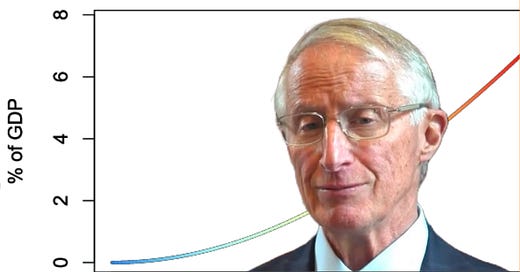Last week I interviewed actuary Sandy Trust on how the financial system is modelling the risks of climate change all wrong, the difference between scientific assessment and risk assessment, and the fact we face catastrophic risks to our economy and planet if we continue as we are.
Sandy explains how the damage function of one man sent financial institutions, regulators and policy-makers down an unscientific path, leading us to a world in which some models show a hothouse earth would actually be beneficial to the climate. William Nordhaus, the man in question, won a Nobel Prize in 2018 for his work showing the potential impacts of climate change, in which he showed three degrees of warming would result in 2% loss of global GDP. In his Nobel Prize lecture, he even claimed 4 degrees of warming “is optimal”.
These astronomically dangerous assertions were based on the fact that 87% of industry operates indoors and thus would not be impacted by the earth’s heating. Economist Steve Keen sums up Nordhaus’ scientific illiteracy beautifully: “Nordhaus equated climate change with the weather.”
Rather than laugh him off-stage, the Nobel Prize committee awarded him with one of the most esteemed validations in the world and policy-makers and financial institutions dutifully integrated his damage function into their work, despite it not being reviewed by climate scientists. The Network for Greening the Financial System, a network of 114 central banks and financial supervisors, tweaked it very slightly, developing a method that shows runaway warming could cause anywhere between just 6% to 21% of damage to our economies.
Madness.
As Sandy points out, it just goes to show just how disconnected our financial system is from our societies and our biosphere. These models do not integrate breadbasket failures, mass migration, or even climate tipping points. The risk is immense—but they fail to grasp it.
Nordhaus’ incorrect calculations are baked into almost every government policy around the world, including the IPCC report. Is it any wonder our governments fail to act in the face of climate change when their policy-wonks present them with reasonable graphs depicting minimal damage? Is it any wonder they ignore civilians in the streets and scientific research? There is a wealth of information out there for people to educate themselves, but those in power have teams to parse through information sets and human beings tend to believe that which already fits their worldview.
Nordhaus’ work has been rebutted and refuted and proven to be utter nonsense many times. A public apology and retraction from him would do immeasurable good, although not equal to the damage his calculations have caused. Holding up his hands and taking responsibility would spur a public conversation and, hopefully, the abandonment of his model. More than ever, we need accountability.
It seems unlikely, though. He will probably hold tight to his Nobel Prize with the wilful blindness of those who stocked the Titanic with too few lifeboats. Validation is a lifejacket in an uncertain world. So many die for the egos of the few.





"It is difficult to get a man to understand something, when his salary depends on his not understanding it." The problem is that accepting reality would mean ending the financial sector. No growth = no capital income = no capitalism. We need more than an apology. We need the world economy to write off some $22 trillion (or roughly 25%).
While this is an excellent and important report on crucial history, it is vital that we use terms like Climate Crisis, Climate Emergency Climate Disruption, Climate Destabilization, Global Warming, and Global Heating (not the Republican PR spin term "Climate Change").
Widespread use of the term "Climate Change" originated in 2003 with Republican PR flack Frank Luntz (a brilliant corporate propagandist) who circulated a memo that got the Bush Administration to replace the properly alarming and accurate term "Global Warming" with the much more benign sounding term "Climate Change" in order to essentially disappear the problem in the public mind. Once Bush started using the term in speeches, all of mainstream media adopted it. This insidious shift in the narrative proved to be a master stroke by Luntz.
Here is a link to an important 2003 report about that very memo, in the UK Guardian: https://www.theguardian.com/environment/2003/mar/04/usnews.climatechange
Very shortly after Bush started using the term, activists like myself and Ralph Nader, immediately began countering Luntz's bullshit spin by pointing out that "Climate Crisis" was a far better term which fit the gravity of the emergency we are facing. But as noted above, Luntz's gambit was pretty effective, and far too many people still fall into using the weaker term that he popularized.
Continued constant use of the term (even by many environmentalists and scientists) drives a milquetoast corporate media narrative, which enables fossil fuel industry funded climate skeptics and deniers to more easily deceive the public.
Here is the link to a 2004 interview in Sierra Magazine with lefty messaging guru George Lakoff, in which he specifically recommends using the far better term "Climate Crisis" to describe the problem, in order to deflect Luntz's deceptive messaging.
"Winning Words: George Lakoff says environmentalists need to watch their language" link:
https://vault.sierraclub.org/sierra/200407/words.asp
To sum it up, it's a crisis, not 'change' and we need to say so.